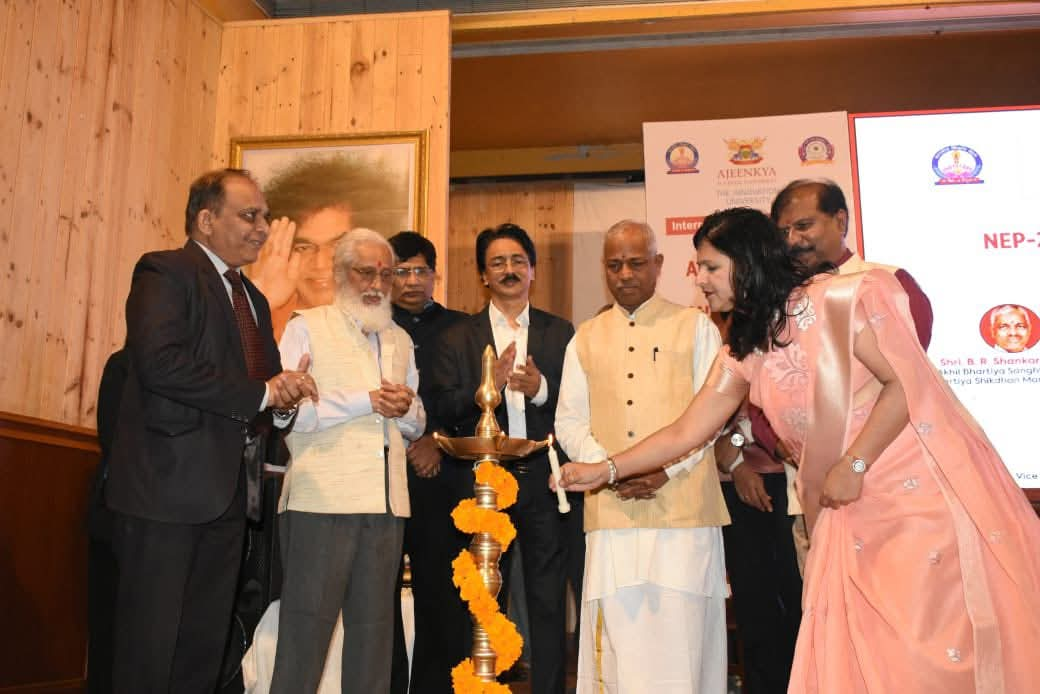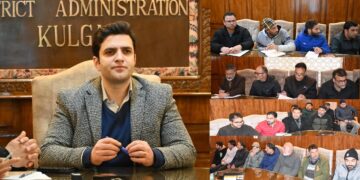JK News Live
Pune, Oct 6: The three-day international conference on “NEP-2020 Analytics and Bhartiya Gyan Sampada: A Pragmatic Perspective” jointly organised by the Central University of Kashmir (CUKashmir), Ajeenkya D Y Patil University and Bharatiya Shikshan Mandal (in blended mode) began on Sunday.
Shri. B. R. Shankaranad, Akhil Bhartiya Sanghtan Mantri, Bhartiya Shikshan Mandal, India and Prof. Anil Sahastrabuddhe, Chairman: National Educational Technology Forum (NETF), Chairman: EC National Assessment and Accreditation Council (NAAC) and Chairman: NBA. New Delhi were the chief guests. Invited speakers included Prof. Kishore G. Kulkarni, Professor, Metropolitan State University of Denver USA, Col. (Prof.) Rajendrakumar Anayath, Akhil Bharatiya Pramukh, Bharatiya Gyan Sampada (BGS) and OSD, Department of Higher Education, Government of Haryana, Prof. Shriram Chauthaiwale, Chairperson, National Curriculum Focus Group Mathematics, NCERT, New Delhi and Prof. Shailendra K.
Deolankar, Director, Higher & Technical Education, Government of Maharashtra.
In his address, CUKashmir, Vice Chancellor, Prof. A Ravinder Nath, underlined the transformative vision of the National Education Policy (NEP) 2020 in shaping learner-centric education. He noted that digital disruption and technological advancement are redefining society and education alike. Prof. A Ravinder Nath highlighted four key pillars of NEP 2020: equitable and inclusive education, multidisciplinary and holistic learning, multiple entry and exit options for upward mobility, and the promotion of online and digital education models in higher and skill education.
Focusing on learners, he classified them into three categories—self-motivated or gifted learners, average learners who require motivation, and passive learners who need continuous attention.
He stressed that NEP 2020 seeks to bridge these gaps through flexible and inclusive approaches. Prof. Nath concluded by affirming that such initiatives are crucial to realize the vision of Viksit Bharat and transforming universities into centres of excellence.
The conveners of the conference, Dr. Haribhau R Bhapkar and Dr. Vijay Kulkarni said the objectives of this conference are to provide a platform for academicians, researchers, educationists, and policymakers to engage in meaningful deliberations on the National Education Policy (NEP) 2020 and the revival, relevance, and integration of Indian Knowledge Systems (IKS) in contemporary education. The conference will encourage research, foster dialogue, and provide actionable insights from a pragmatic perspective.
Dr. Rakesh Kumar Jain, Vice-Chancellor, Ajeenkya DY Patil University, emphasized that innovation continues to be the guiding philosophy of the institution, describing it as “our driving force, our foundational ethic, and our defining strength.” He observed that NEP 2020 encourages multidisciplinary education and empowers students to pursue degrees that reflect breadth as well as depth of knowledge.
Prof. Anil Sahastrabuddhe talked about the importance of Indian Knowledge Systems (IKS) and its relevance in modern times. Calling for internships in IKS, he said these will provide students with hands-on experience in traditional Indian arts, sciences, and philosophies, helping them appreciate the depth of our cultural heritage. “Our ancient texts emphasize the importance of living a life rooted in dharma (righteousness), karma (action), and ahimsa (non-violence). These values are essential for personal growth and societal harmony.”
Prof. Shailendra K. Deolankar explained about how the Maharashtra government implemented NEP-2020 effectively and pragmatically for achieving the vision of Vikshit Bharat@47.
Shri Shankaranand ji, Akhil Bharatiya Sangathan Mantri of the Bharatiya Shikshan Mandal, emphasized the need to recast teaching as a noble profession that nurtures both knowledge and values. He underlined the essence of Indianness, Indian culture, and the IKS, asserting that “India unites, but never divides.” He called for the pursuit of wisdom that leads to universal welfare, framing NEP 2020 as rooted in Bharatiya drishti—a vision combining knowledge, science of life, and cultural heritage.
He expressed confidence that if collective efforts are pursued with sincerity, within the next 10–15 years India will emerge as Vishwaguru—a global leader in knowledge and values.
(Issued through Public Relations Office CUK)







